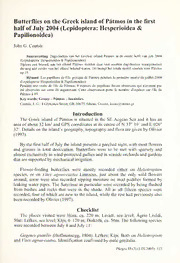
Butterflies on the Greek island of Patmos in the first half of July 2004 (Lepidoptera: Hesperioidea & Papilionoidea) PDF
Preview Butterflies on the Greek island of Patmos in the first half of July 2004 (Lepidoptera: Hesperioidea & Papilionoidea)
: Butterflies on the Greek island of Patmos in the first & half ofJuly 2004 (Lepidoptera: Hesperioidea Papilionoidea) John G. Coutsis Samenvatting. Dagvlinders vanhet Griekse eiland Patmos in de eerste helftvanjuli 2004 (Lepidoptera:Hesperioidea&Papilionoidea) Tijdens een bezoek aan het eiland Patmos werden daar vier soorten dagvlinders waargenomen dienognieteerdervanheteilandbekendwaren. DitbrengthettotaleaantalsoortenvoorPatmos op 19. Résumé. Lespapillonsde1'ïlegrecquedePatmospendantlapremièremoitiédejuillet2004 (Lepidoptera:Hesperioidea&Papilionoidea) Pendantune visite de 1'ïle de Patmos, 4 espèces de papillons furent observées qui n'avaientpas été observées sur cette ïle auparavant. Cette observation porte le nombre d'espèces sur 1'ïle de Patmosa 19. Keywords: Greece-Patmos-faunistics. Coutsis,J.G.:4GlykonosStreet,GR-10675Athens,Greece,[email protected]. Introduction The Greek island ofPatmos is situated in the SE Aegean Sea and it has an area ofabout 32 km2 and GPS coordinates at its centre ofN 37° 19' and E 026° 322 Details on the island’ geography, topography and flora are given by Olivier s (1997). By the first halfofJuly the island presents a parched sight, with most flowers and grasses in total desiccation. Butterflies were to be met with sparsely and almost exclusively in wind-protected gullies and in seaside orchards and gardens that are supportedby mechanical irrigation. Flower-feeding butterflies were mostly recorded either on Heliotropium species, or on Vitex agnus-castus Linnaeus, just about the only wild flowers around; some were also recorded sipping moisture on mud puddles formed by leaking water pipes. The Satyrinae in particular were recorded by being flushed from bushes and rocks that were in the shade. All in all fifteen species were recorded, four ofwhich are new to the island, while the rest had previously also beenrecordedby Olivier (1997). Checklist The places visited were Hóra, ca. 220 m; Livadi, sea level; Agrio Livadi, 50m; Léfkes, sea level; Kipi, 0-120 m; Diakófti, ca. 50m. The following species were recordedbetween July 8 and July 1 1 Gegenespumilio (Hoffmansegg, 1804). Léfkes; Kipi. Both on Heliotropium and Vitexagnus-castus. Identification confirmedbymale genitalia. Phegea33(3)(l.IX.2005): 115 Figure 1: MapofGreecewiththepositionoftheislandofPatmosintheSouthernAegeanSea. Figure2:MapoftheislandofPatmos,indicatingthesamplinglocalities. Phegea33(3)(l.IX.2005): 116 . Carcharodus alceae (Esper, 1780). Agrio Livadi; Kipi. On dry grasses and on Vitexagnus-castus. Iphiclides podalirius (Linnaeus, 1758). Léfkes; Hóra; Kipi. Mostly in the vicinity oforchardtrees andon Vitexagnus-castus. Papilio machaon (Linnaeus, 1758). Livadi; Kipi. Pieris brassicae (Linnaeus, 1758). Hóra; Kipi. In the latter location on Vitex agnus-castus. Pieris rapae (Linnaeus, 1758). Kipi; Léfkes. Pontia edusa (Fabricius, 1777). Kipi. New to Patmos. Lycaenaphlaeas (Linnaeus, 1761). Kipi. In small numbers onHeliotropium. Lycaena thersamon (Esper, [1784]). Kipi. Very few onHeliotropium Syntarucuspirithous (Linnaeus, 1767). Léfkes. Two on the leaves ofa lemon tree. New to Patmos. Polyommatus icarus (Rottemburg, 1775). Léfkes; Kipi. On mudpuddles. Lasiommata maera (Linnaeus, 1758). Kipi. A single male flushed from bushes. New to Patmos. Maniola telmessia (Zellar, 1847). Léfkes; Kipi. A few females flushed from bushes and a single male on awaterpuddle. ConfirmedbyMale genitalia. A Vanessacardui (Linnaeus, 1758). single specimen atDiakófti. Polygonia egea (Cramer, [1775]). Hóra. Onbuildingwalls. New to Patmos. Discussion To the fifteen species presented here, one should also add another four butterflies (i.e. Zerynthia cerisy (Godart, 1824), Colias crocea (Fourcroy, 1785), Polyommatus loewii (Zeiler, 1847) and Vanessa atalanta (Linnaeus, 1758)), all ofwhich were listed by Olivier (1997), but missed by the present author. This brings the sum-total of butterfly species known from Patmos to a modest nineteen. This paucity in butterflies seems to be the characteristic ofall Aegean islands that have a small landmass, a pronounced geographic isolation, a lack of water sources, a poor and non-diversified flora and an exposure to very frequent strong northemwinds, known as "meltémia". References Olivier, A. 1987. Catalogue ofthe butterflies ofthe Greek islands in the collection ofthe Instituut voor Taxonomis—che Zoölogie (Zoölogisch Museum) Amsterdam (Lepidoptera: Hesperioidea & Papilionoidea). Phegea15: 77-88, 165-170. — Olivier,A. 1990. ButterflyrecordsfromtheGreekislandofPatmos(Lepidoptera: Papilionoidea). Phegea18 31-32. : Olivier, A. 1997. Butterflies on the island of Patmos (Greece) in April, 1995, with an updat—ed checklist and biogeographic notes (Lepidoptera: Hesperioidea & Papilionoidea). Entomologists’RecordandJournalofVariation 109 295-298. : Phegea33(3)(l.IX.2005): 117
